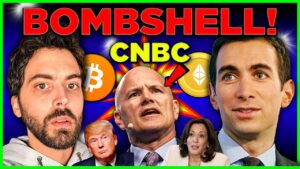This chart shows consumers' confidence in the economy
during the Biden and Trump administrations. As of June 2024, confidence in the economy under
President Biden averaged nearly 28 points Lower compared to during former President Trump's
term. It hit an all-time low back in June of 2022. According to the latest survey from Gallup, 53% of
Americans believe the Republican Party will do A better job with the economy, compared to just 39%
who favor the Democrats. At this point, every survey that I know of tells me
that Republicans are seen as Having the advantage for the management of the
economy. Voters seem to think that President Trump was a better
steward of the economy than President Biden. And I think that's going to be an important
advantage for Republicans. While the U.S. technically isn't in a recession,
roughly three out of five Americans believe it is. In 2024, nearly three-quarters of Americans said
strengthening the economy should be a top policy Priority. While a third mentioned economic issues as
the nation's most important problem. I think that the economy is really top of mind for
people. They are really concerned with how their families are
doing financially and economically. You know, we are in a very strange situation where
people don't feel like they're thriving in spite of Many strong indicators in the economy. So did Americans enjoy a better economy under President
Trump or Biden? And which candidate will be able to fix the economy? I think a lot of economists and commentators, and
certainly a lot of politicians, believe that there is a Disparity between how consumers are feeling about the
economy and what the High-level economic statistics about economic growth,
about the level of employment, about the Rate of unemployment are telling you. Statistics of that sort cut very little ice with
average households and with Voters. They judge principally on the basis of their
own experience. From the standpoint of consumers and average
households, the issue is how am I Living? Is my ability to afford the basics of daily
life, Improving or not? President Biden's term has seen the highest inflation
in 40 years, reaching a four-decade peak of 9.1% in June 2022. As of June 2024, prices rose by 19.3% during his term,
compared to just 5% for former President Trump during the same time
frame in office. Consumer sentiment during President Biden's time in
office has been quite weak, and I think the explanation For that is pretty straightforward.
People really don't like inflation. High inflation also ate into Americans' purchasing
power. According to estimates, the average inflation-adjusted
weekly paycheck shrunk by about 4.4%, or $50 during Biden's term. That's despite the fact that wages have risen faster
under Biden than under Trump. Average households have judged that their wages,
salaries, and annual incomes have not been Rising robustly during this period, even as there's
been an extended period of what Economists regard as full employment. Price inflation has been growing faster than wage
inflation, so the purchasing power of Wages has actually gone down. You're able to buy less with every dollar you earn. When you have buying power that's been eroded, what in
the past might have seemed like a necessity is all of a Sudden at risk. And so, a $4 cup of coffee at
Starbucks, or a $5 plus Value meal at McDonald's becomes a luxury under those
circumstances. And all of a sudden, even though that's not occurring
in the context of a technical Recession, it feels recession-like to many. A technical definition that's irrelevant for somebody
who can't afford to buy what they want, Much less can't afford what they need. Nevertheless, economists acknowledge that the Biden
administration has made significant strides in growing The economy. The challenge associated with the pandemic, and then
the beginning of the Biden administration, was one of The most immense and difficult challenges that has
faced the American economy and by extension, A president and political leaders and the citizenry. One of the most challenging in a century. The performance of the US economy, let's say, over the
last couple of years as we speak in 2024, Has been much more robust and resilient than would
have been expected. A direct comparison of hard economic data shows that
the economy under Biden was stronger than it was under Trump, across several important measures. Discounting the months most affected by the pandemic,
Biden's administration added a monthly average of 269,000 jobs, compared to Trump's 180,000. The S&P 500 index also saw a 42.1% rise during Biden's
term, Compared to 33.6% over the same period for Trump,
hitting record highs in 2024. Overall, the US economy grew by 8.4% since Biden
took office, Compared to 6.5% during the same period under Trump.
We brought this economy back from the brink, and we've
designed our strategy not only to provide for a Temporary boost, but to lay the foundation for a
long-term boom That brings everyone along. But the economy's rebound cannot be solely attributed
to the Biden administration. Part of that is the fiscal response that emanated
because of actions by presidents and the House and Senate in spending money to ride to the
rescue. The other part of it is that the Federal Reserve gets
pretty good marks for having eventually shown up And restricting interest rates and allowing for a
sustainable economic expansion. Experts also say that the very measures aimed to boost
the economy were also what hurt the consumers in the End. As a result of the various stimulus packages enacted in
2020 and 2021, economists estimate that American households had
accumulated $2.5 trillion more in savings than they would have had
without The stimulus bills that were enacted under first
Donald Trump and next Joe Biden. And so when the economy reopened, that huge
pile of accumulated savings Came up against an economic reopening that was spotty. And famously, the supply chains that helped companies
in the United States Produce what American consumers wanted, those supply
chains were snarled And disrupted. So if inflation is too much money, meeting too few
goods, right? The stage was set for a classic spike of inflation,
and that's exactly what Happened. To combat this inflation, the Federal Reserve has had
to raise interest rates to relatively High levels, and that affects the interest rate that
you pay on your credit card statement. It affects the interest rate that you face if you want
to take out a loan to buy a car. It certainly affects the interest rate if you want to
take out a mortgage and buy a home. And so uncertainty about the level of prices,
declining inflation-adjusted wages and Incomes, and really high interest rates all add up to
consumers not feeling Great about how things have been going over the last
few years. Economists are still debating how much Biden's stimulus
can be blamed for the burden of inflation. President Trump had also signed a $2.2 trillion
stimulus bill into law during his time in Office, sending out $814 billion worth of financial
relief to those affected by the Pandemic over three rounds of stimulus checks. When the American Rescue Plan was signed, the
unemployment rate was falling, not rising.
The economy was growing, not shrinking. Households were sitting on a whole bunch of excess
savings. Putting a bunch of stimulus into a growing economy
doesn't make sense. So if the American Rescue Plan had never happened, we
still would have had an inflation problem. But in my view, the American Rescue Plan took what
would have been a moderate but still Real inflation problem and turned turn it into pretty
severe inflation problem. And I would even go so far as to say that the American
Rescue Plan was probably the most reckless fiscal Policy pursued by the US government in decades. We do not know, and may never know what would have
happened to the economy If the Biden administration had done nothing to
further stimulate it after it Took office. The American Rescue Plan passes any cost-benefit
analysis with flying colors f Or two reasons. One, I know critics want to assign inflation to the
American Rescue Plan. Inflation went up in every advanced economy, and in
fact, it went up more in Europe and the UK than it Did here. And that's because of their closer exposure
to the war. As the supply chain snarl-ups began to resolve, you
saw inflation come down And at the same time, the rescue plan reduced child
poverty, preserved union pensions, Helped families and businesses get to the other side
of the crisis. So the twofold reason why the critiques of the rescue
plan are wrong is because they misdiagnose inflation as A uniquely US problem, and they ignore the benefit
side of the ledger. Former President Trump's campaign did not respond to
CNBC's request for comment. But a consensus among economists is that neither Biden
nor Trump is entirely to blame. I think it is never fair to blame or credit a single
president for what's happening In the economy, when those things were happening
before that person even took office. The primary causes of inflation were really two things. One was the imbalance between supply and demand. As supply chains really seized up and we had the lack
of production of a lot of things, and we had Immense demand for a lot of things that could not be
or wasn't matched by production. Sort of adding a second leg to inflation was Russia's
invasion of Ukraine that led to massive Increases in commodities' prices and energy costs. To some degree, consumers themselves were to blame for
the inflation, because who is it that has the Say over demand for goods and services? It's all the people who buy those things.
And so consumers themselves help to inflame this
imbalance between supply and demand. But, you know, if you're talking about putting food on
the table, you don't have a lot of choice. You might have some choice in what you buy, but you
don't have choice in whether you're going to buy food And energy and paying for shelter. At the end of the day, a president often has very
limited impact on how the economy performs. Americans have a tradition of either giving credit for
the performance of the economy To the president, or giving blame to the president for
the performance of the economy. And the irony about all that is whether that's
deserved or not, the presidents Themselves try to take credit or blame shift with
respect to the performance of the Economy, whether it's warranted or not. I think ascribing a great control of the economy to
any Given president is a fool's errand. And what I mean by that is the US economy, which is
connected to the global economy, Is much more complex than that. My sense is that ultimately, our US Federal Reserve
and its decisions are much more Important, much more relevant and meaningful for how
the economy performs than a US president. The unprecedented nature of the pandemic also makes it
challenging to directly compare the economies during Biden's and Trump's terms. The sharp break that we see in sentiment is not so much
between Trump and Biden, but I would say before and After the Covid pandemic. A talking point that's being used against President
Trump is that he lost more jobs than any President ever. Those job losses that occurred at the end of his term
were a consequence of the pandemic. I think President Biden is being heavily criticized
about the inflation of the United States has Experienced. The American Rescue Plan made our
inflation problem a lot worse. But we still would have had an inflation problem even
if it weren't for the American Rescue Plan. You can't look at the last five, eight, ten years
without sort of Saying asterisk, maybe ten asterisks. There was this pandemic. There's just no way to separate that out. And if you do, you risk being wrong or simply
overlooking an Immense event in recent American and human history. Even so, the Republicans may have the advantage on
economic issues in voters' eyes.
Every survey that I know of tells me that Republicans
are seen as having the Advantage for the management of the economy. Time will tell whether that gap can be narrowed, but
right now, the gap is Real, and it is significant in its size. For the Democrats, it's up to Kamala Harris to convince
voters of what she can achieve with the economy. I think Vice President Harris was given an opportunity
in a sense by President Biden when I think mistakenly he seized upon this phraseology of
Bidenomics, which was to take Essentially too much credit for the performance of the
US economy, which, unbeknownst to him, ended up Being translated to blame for the inflation that most
Americans associate with their current Experience. Being at the top of the ticket, rather than being at
the bottom of the ticket, gives her the opportunity to State her own priorities, reintroduce herself to the
American people. It's not clear that Democrats can score an outright win
when you Turn to visions of the future, as opposed to arguments
about the past, but I think They have a better chance of narrowing the economic
gap that now separates the two Parties in the eyes of the American people, if they
focus on the future.




